
views
X
Research source
But that doesn't mean they don't work sometimes! The best way to detect a lie is to look not at any specific behaviors, but at how those behaviors change from the person's baseline—how they'd act if they were telling the truth.[2]
X
Research source
Read on for a list of some hints that what someone's telling you might be less than truthful—or at least that they're really nervous about what they're saying.
Breathing Rapidly

Some people may breathe more shallowly when they lie. Breathing quickly and shallowly is a symptom of nervousness. People are often nervous when they lie, especially if they're worried they're about to get caught doing something they shouldn't have been doing. As you listen to the person's breathing, keep an eye on their posture as well. A person breathing quickly and shallowly will lift their shoulders and have a lighter tone of voice.
Changes to Fidgeting Behavior
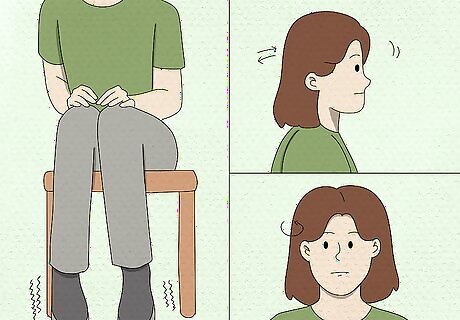
A liar might fidget more than normal to reflect their discomfort. Psychologically, people don't like to lie. If a person who normally doesn't fidget a lot when they speak suddenly starts shuffling their feet, moving their head from side to side, or shifting back and forth, they might be lying. On the other hand, if the person is aware of the fact that they'll seem untrustworthy if they fidget a lot, they might look still as a statue and make no movement whatsoever. In any nerve-wracking situation, such as telling a lie, the body can go into "fight or flight" mode. Fidgeting indicates a "flight" response while staying absolutely still is more of a "fight" response. Keep the person's baseline behavior in mind if you're familiar with it. The key here is to focus on changes from that person's baseline norm, not specifically whether they're fidgeting. Some people with anxiety, ADHD, or other disorders may have a tendency to fidget around more, so keep that in mind if the person you think is lying has any of that.
Fleeting Micro-expressions

Brief micro-expressions can display a liar's true emotions. A micro-expression is created subconsciously when a person's facial expression shifts for a fraction of a second. These micro-expressions can't typically be controlled and tell you what the person is truly feeling. This is an especially valuable clue if the micro-expression doesn't match what the person is saying. For example, a liar might show a micro-expression of guilt or regret while claiming that they're innocent and didn't do anything wrong.
Darting Eyes

Darting eyes can be a big sign of discomfort. If someone just lied to you, they're probably feeling uncomfortable, especially if you're peppering them with questions. If their eyes start shifting rapidly from left to right, there's a good chance that they aren't telling the truth. Be careful with this indicator. It could simply mean that the person is nervous or uncomfortable with eye contact generally. There's actually no scientific evidence connecting eye behavior with truthfulness.
Less Blinking
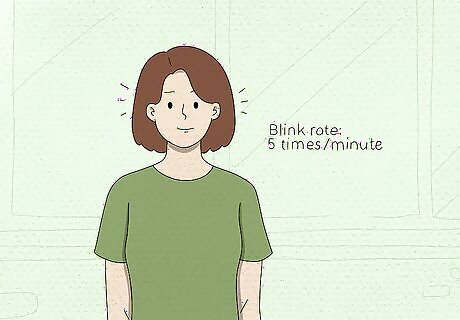
People who are lying tend to blink far less often. People tend to blink, on average, about 5 times a minute. Rapid blinking suggests nervousness. But people who are lying tend to blink far less because the act of lying is more mentally taxing than telling the truth—a phenomenon researchers refer to as "cognitive load." When someone is doing something mentally taxing, they tend to stop doing other things, such as blinking. On the other hand, an increase in blinking could indicate that the person is lying. Lying causes more stress and anxiety, which could cause them to blink more.
Faking a Smile

A real smile affects the entire face and matches what the person is saying. When a liar smiles, their expression may look tight or forced, instead of genuine. Think of it this way—if you see crow’s feet on a person’s face, they’re probably telling the truth. They'll also be saying something that it seems natural for a person to smile when they say. This can also be a sign that the person is simply nervous. Nervous smiling or even laughter that doesn't really match what the person's saying can simply indicate that they're intimidated by you or the questions you're asking.
Touching Their Face
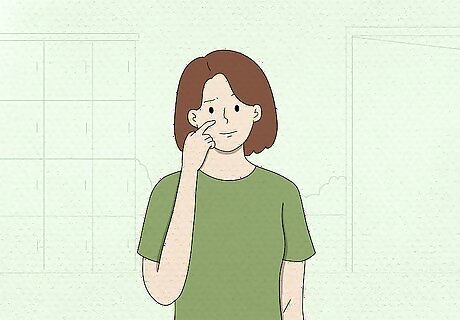
People engage in "self-soothing" techniques when they're lying. Because the act of lying is uncomfortable, people often touch their face or their neck, pull on their collar, or run their hands through their hair. These acts can also signal that the person is simply nervous, though, which might have nothing to do with lying. For example, someone might scratch their cheek or nose, or rub their nose repeatedly as they speak. They might also run their hand down the back of their neck or over their hair.
Pursing Lips

Liars tend to purse their lips more often than usual. This is one of the few nonverbal signs that's actually backed by science. Because people's mouths tend to get dry when they're lying, they have a tendency to purse or lick their lips more. If their lips look tight and pinched, they might be hiding the truth.
Sweating Excessively

The body tends to sweat extra after telling a lie. Does the person’s forehead, cheeks, or back of the neck seem especially sweaty? See if the person starts wiping at these areas more than they usually would. This could indicate that they're not being honest with you.
Flushing or Turning Pale

Both flushed or pale cheeks can be a sign of lying. After telling a lie, a liar might experience a rush of adrenaline—this adrenaline causes them to blush. In other cases, telling a lie may cause the blood to rush out of a person’s face, which makes them look pale.
Shaking Their Head

People sometimes shake their heads left and right when they lie. This is a subconscious clue that what they're telling you might not be the truth. As they speak, their brain knows the words are false, and they shake their head "no." When people are telling the truth, on the other hand, they tend to nod. Pay close attention whenever they make a statement—if they shake their head while speaking, they might be lying.
Delayed Gesturing
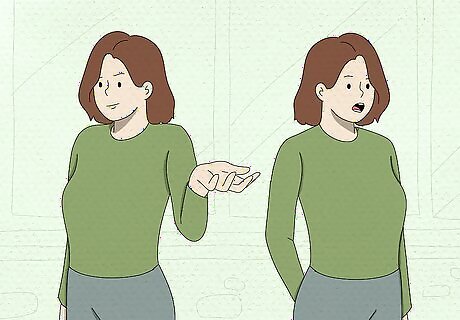
Usually, people gesture while they're talking, not after. People who are lying tend to gesture after they've said something, rather than as they're talking. Pay attention to the person's hand movements and watch for movements that come late. For example, if the person says something to indicate they were frustrated or exasperated, and then a split second later they throw their hands up in the air, they might be lying.
Making Quick Corrections

Liars often can't keep track of their stories. Because the story is made up, a liar might forget what they said or lose track of where in the story they are. They'll slip up along the way and "correct" themselves. While a couple of corrections aren’t necessarily suspicious, constant backtracking and editing definitely are.
Repeating Words

Liars tend to repeat words for different reasons. They might say the same phrase over and over to drill it in your mind, or to give themselves some extra time to put together a good lie. Regardless, it’s probably bad news if the person in question is repeating themselves a lot. For example, the person might say “I didn’t do it” over and over again, or “Listen to me.”
Speaking Vaguely

Liars tend to gloss over the details. A truthful person will remember and include the little details in a story, like what was playing on the radio, or what color the wallpaper was. Since they’re making up or heavily editing a story, a liar won’t have this same attention to detail and will speak in a vague, basic way. On the other hand, a liar who has rehearsed their story might have more to say because they've had time to concoct those details.
Talking Formally

A liar tends to use fewer contractions or slang when they speak. Because they're fabricating a story, they're not speaking naturally. They might talk at a slightly slower pace, use more formal or proper words and phrases, or use full words rather than contractions. For example, someone who's lying might say, "I did not do it," rather than, "I didn't do it," or "It wasn't me."
Speaking in a High Pitch

The vocal cords tend to tighten when a person feels nervous or stressed. Because of this, if someone is telling a lie, their voice might sound a lot higher than usual. Their voice might also crack or sound a bit creaky, causing them to clear their throat a lot to relieve the tightness. This signal can vary among cultures. One study found that Chinese people tend to speak in higher-pitched voices while lying but Hispanic people tend to speak in lower pitches.
Using Vocal Filler
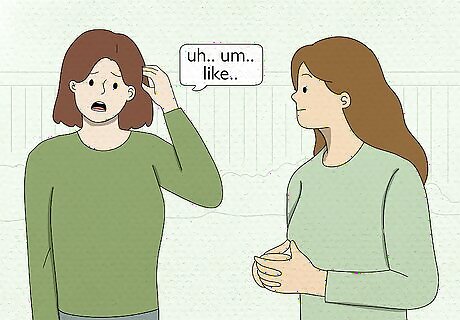
Words such as "uh," "um," and "like" can indicate lying. This is especially true if a liar hasn't yet rehearsed their story and is trying to string it together on the spot. They'll use these filler words to close the gaps while they're trying to think of the next thing they want to say.
Using Negative Emotion Words
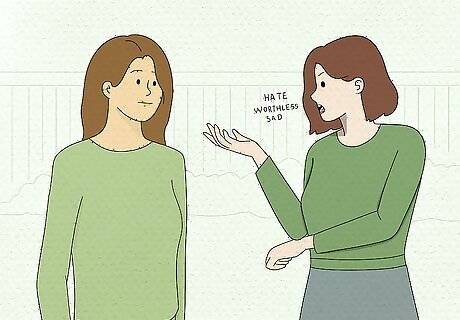
Liars use words such as "hate," "worthless," or "sad" more frequently. Liars tend to be more anxious than people that are telling the truth. Because of this, they feel guilty and tend to focus on negative emotions more than an honest person would.
Overstating Honesty

A truthful person doesn't state their honesty over and over again. Liars often feel the need to remind you how honest they are. If they toss around phrases such as “in all candor” or “if I’m being totally honest,” there’s a good chance they aren’t actually being honest at all.
Answering Quickly

If a liar has rehearsed their story they might rush to get it out. Typically, when you ask someone a question, they'll pause for a moment to think of their answer before responding. If the person has a quick, detailed response that sounds somewhat rehearsed, they might be lying. Unanticipated questions can help you better determine if the person is lying. You'll put them on the spot, forcing them to come up with information that's consistent with what they've told you so far.
Using Passive Voice
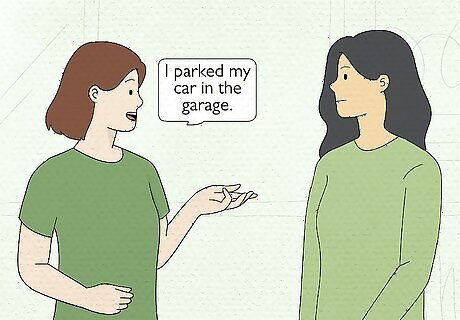
Liars tend to use fewer "I" statements or own their actions. A liar is typically trying to deflect from what they did, so they'll use passive voice. They'll make it sound as though something simply happened, rather than saying exactly what they did. For example, a liar might say, "The car was in the garage," rather than, "I parked my car in the garage."




















Comments
0 comment